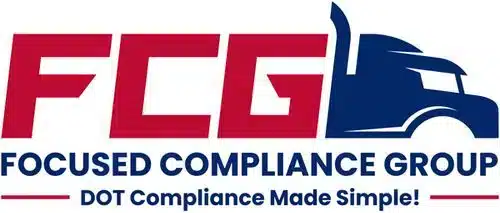
Operating commercial motor vehicles (CMVs) requires strict adherence to regulations set forth by the Department of Transportation (DOT) and the Federal Motor Carrier Safety Administration (FMCSA). Non-compliance can lead to significant DOT fines, impacting both financial stability and operational efficiency. Additionally, non-compliance can also lead to safety rating downgrades, which can affect business opportunities. This article delves into common Department of Transportation violations, associated penalties, and strategies to maintain compliance.
Overview of DOT Compliance and FMCSA Violations
The FMCSA enforces regulations to ensure the safety of CMV operations. Violations can range from administrative oversights to severe safety breaches. Penalties are structured to reflect the severity and potential impact of the violation.
Severe violations can lead to the revocation of operating authority, impacting the ability to conduct business.
Understanding DOT and FMCSA Regulations
The Department of Transportation (DOT) and the Federal Motor Carrier Safety Administration (FMCSA) regulate the trucking industry to ensure safety on the roads. Understanding these regulations is crucial for commercial motor vehicle operators to avoid fines, penalties, and even cease operations. The FMCSA sets rules for hours of service, vehicle maintenance, and driver qualifications, among others. Familiarity with these regulations can help prevent authorizing employee violations, record-keeping violations, and other employee violations that can lead to DOT audits and fines.
Common Violations and Increased FMCSA Fines

Hours of Service (HOS) Violations
-
HOS regulations are designed to prevent driver fatigue by limiting driving and on-duty hours. Common violations include:
-
Exceeding Driving Time Limits: Drivers are limited to 11 hours of driving after 10 consecutive hours off-duty. Exceeding this limit can result in fines ranging from $1,000 to over $16,000, depending on the severity.
-
Failing to Take Mandatory Breaks: Drivers must take a 30-minute break after 8 hours of driving. Neglecting this requirement can lead to fines and impact the drivers Compliance, Safety, Accountability (CSA) score.
Falsifying Logs: Intentionally falsifying driving logs is a serious offense, with penalties up to $15,846.
Vehicle Maintenance Violations
Proper vehicle maintenance is crucial for safety. Common violations include:
-
Brake System Deficiencies: Issues such as out-of-adjustment brakes or brake hose/tubing chafing can lead to fines and out-of-service orders.
-
Lighting Violations: Inoperative or missing lamps and reflective devices are common infractions. Ensuring all lighting is functional can prevent these violations.
-
Tire Violations: Tire tread depth less than 2/32 of an inch or flat tires can result in penalties. Regular inspections are essential.
Driver Qualification Violations
Ensuring drivers are properly qualified is a legal requirement. Common violations include:
-
Operating Without a Valid Commercial Drivers License (CDL): This can result in fines up to $7,155.
-
Expired Medical Examiners Certificate: Drivers must maintain a valid medical certificate; failure to do so can lead to penalties.
Record-keeping Violations
-
Accurate record-keeping is vital for compliance. Violations include:
-
Failure to Maintain Records of Duty Status: This can result in fines up to $1,584 per day, with a maximum total penalty of $15,846.
Knowing Falsification of Records: Intentional falsification can lead to penalties of $15,846.
Consequences of Violations
Beyond financial penalties, violations can lead to:
-
Out-of-Service Orders: Certain violations result in immediate cessation of operations until issues are rectified.
-
Safety Rating Downgrades: Accumulation of violations can negatively impact a carriers safety rating, affecting business opportunities.
-
Legal Liabilities: In cases of accidents, non-compliance can lead to increased legal exposure.
-
Increased Insurance Premiums: Non-compliance can also lead to increased insurance premiums, further impacting financial stability.
Fines and Penalties for Non-Compliance
The Federal Motor Carrier Safety Administration (FMCSA) has ramped up its fines and penalties for non-compliance with Department of Transportation (DOT) regulations. The maximum daily penalty for DOT record keeping violations has increased from $1,544 to $1,584, while the maximum total penalty has risen to $15,846. These heightened fines are part of the growing costs in the trucking industry, which also include rising insurance premiums, CDL speeding ticket fines, and the financial fallout from accidents.
The FMCSA’s civil penalties are detailed in Appendix B to Part 386, Title 49. Here are some of the most common commercial vehicle, DOT record keeping, and CDL violations, along with their current and new fines for 2025:
-
Record keeping Violations: – Current fine: $1,544
-
New fine: $1,584
-
CDL Violations:- Current fine: $15,445
-
New fine: $15,846
These increased penalties underscore the importance of adhering to DOT regulations to avoid significant financial repercussions.
Strategies for Compliance
To avoid Department of Transportation fines, consider the following:
-
Regular Training: Ensure drivers and staff are well-versed in DOT and FMCSA regulations.
-
Routine Vehicle Inspections: Implement a rigorous maintenance schedule to prevent vehicle-related violations.
-
Accurate Record-keeping: Utilize electronic logging devices (ELDs) to maintain precise records of duty status.
-
Compliance Audits: Conduct regular internal audits to identify and address potential compliance issues proactively.
By prioritizing compliance, carriers can avoid costly DOT fines and ensure the safety and efficiency of their operations. One of the best ways a trucking company can avoid fines for violations is to partner with a expert DOT compliance team such as us here at Focused Compliance Group. Give us a call today or schedule a call so we can address your companies concerns and make sure you keep making money and not paying money in unnecessary or avoidable DOT fines.
Mitigating the Risk of Fines and Penalties
To mitigate the risk of fines and penalties, trucking companies must take control of their DOT compliance. This involves keeping driver files in order and audit-ready, engaging a DOT compliance consultant to identify problem areas, and implementing a compliance software platform like Dash. By taking these proactive steps, trucking companies can avoid CDL violations and expensive DOT fines.
Additionally, trucking companies should be aware of the increased risk of unannounced offsite DOT audits, which have surged by 400% between 2019 and 2020. Enforcement officers can now complete audits faster than ever due to technological advancements, and companies may have only 48 hours to submit all of their DOT driver records in a digital format.
To avoid fines and penalties, trucking companies should ensure compliance with FMCSA regulations, including authorizing employee violations, commercial motor vehicles, recordkeeping violations, employee violations, and DOT regulations. They should also be aware of the severe consequences of non-compliance, such as cease operations, increased FMCSA fines, and issues with permitting operation.
By understanding the risks and taking proactive steps to mitigate them, trucking companies can avoid fines and penalties and ensure a safe and compliant operation.
Consequences of Non-Compliance
Non-compliance with DOT and FMCSA regulations can have severe consequences, including increased FMCSA fines, penalties, and even the revocation of operating authority. The maximum daily penalty for committing DOT record-keeping violations has increased to $1,584, while the maximum total penalty is now $15,846. Additionally, enforcement officers can conduct offsite audits, which can result in fines and penalties if violations are found. The trucking industry is also subject to other costs, such as CDL speeding tickets and insurance premiums, making compliance even more critical.
Preparing for DOT Audits and Ensuring DOT Compliance
Preparing for DOT audits requires a proactive approach to ensuring DOT compliance. This includes maintaining accurate records, conducting regular vehicle inspections, and ensuring driver qualifications are up-to-date. Commercial motor vehicle operators can also benefit from implementing a compliance program that includes regular audits and training for employees. By taking these steps, operators can reduce the risk of record-keeping violations, employee violations, and other issues that can lead to fines and penalties.
Best Practices for Commercial Motor Vehicles
Best practices for commercial motor vehicles include regular maintenance, proper loading and securing of cargo, and adherence to hours of service regulations. Operators should also ensure that drivers are properly trained and qualified, and that vehicles are equipped with the necessary safety features. Additionally, operators should maintain accurate records, including written certification of vehicle inspections and maintenance. By following these best practices, commercial motor vehicle operators can reduce the risk of accidents, fines, and penalties.
Resources for DOT Compliance

There are several resources available to help commercial motor vehicle operators ensure DOT compliance. The FMCSA provides guidance on regulations and compliance, including information on permitting operation and intermodal equipment. Operators can also consult with compliance experts, such as those here at Focused Compliance Group, to ensure they are meeting all regulatory requirements. Additionally, operators can use programs such as those offered by Focused Compliance Group, to streamline compliance processes and reduce the risk of record-keeping violations and other issues. By taking advantage of these resources, trucking companies can ensure they are in compliance with DOT regulations and avoid fines, penalties, and other consequences.
